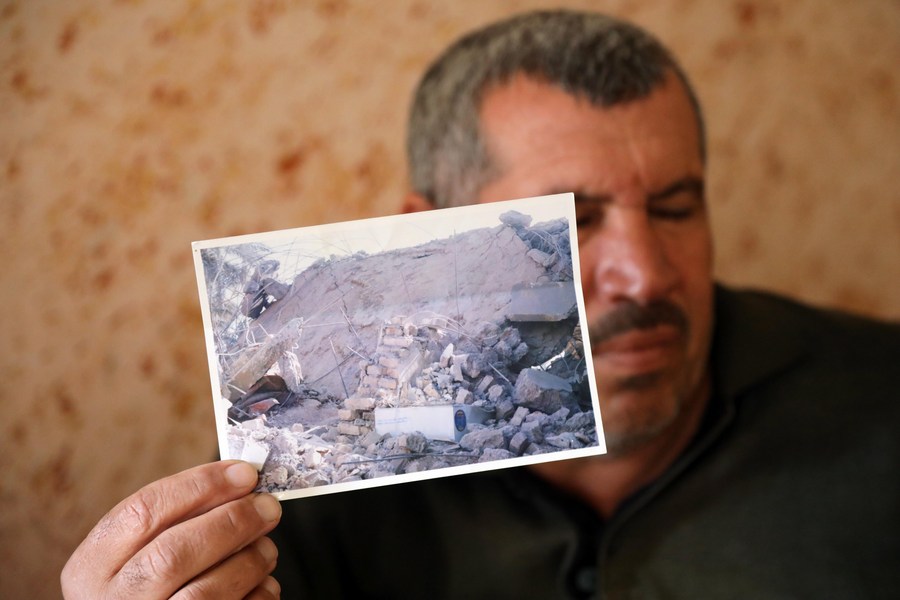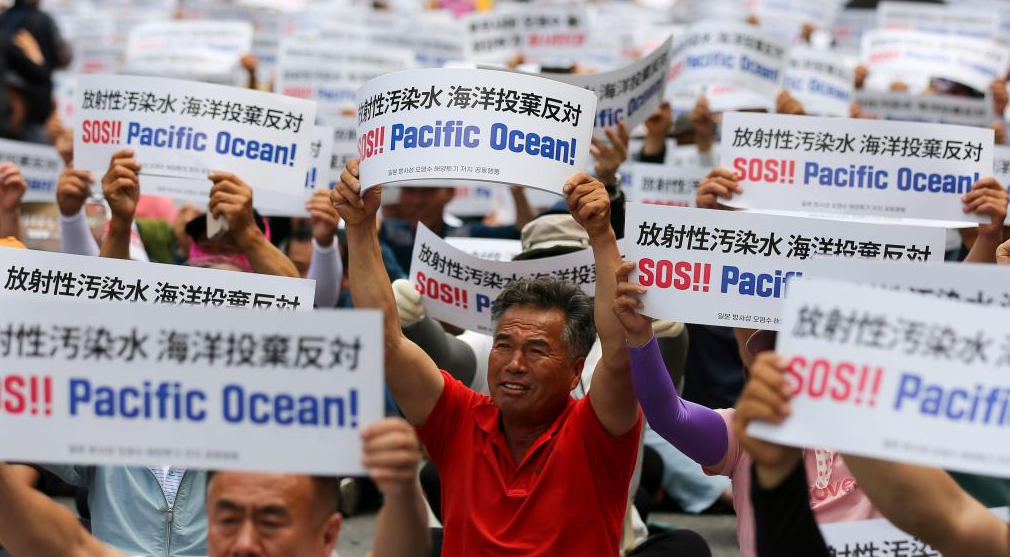Xinhua Commentary: Why is America losing Middle East?

Photo taken on Sept. 2, 2021 shows damaged vehicles at the site of the U.S. airstrike in Kabul, capital of Afghanistan. (Photo by Saifurahman Safi/Xinhua)
"The Arabs don't listen to foreigners who have played a destructive role in the Arab world in recent decades," Ebrahim Hashem, a UAE analyst, said.
BEIJING, June 15 (Xinhua) -- In media reports regarding the United States' Middle East policy, "failed" has become a high-frequency word, as exemplified by a recent hard-hitting analysis of Qatar-based Al Jazeera, which said "the U.S. is losing ground in the region" and "it has only itself to blame."
This view prevails in the Middle East. For decades, the United States, roughly 10,000 km far from the region, has recklessly interfered in regional affairs, causing conflicts, confrontation, wars and poverty. The U.S. hegemony has inevitably led to the region's decoupling from Uncle Sam.
By wantonly waging wars, the U.S. military hegemony has created unprecedented disasters in the Middle East. In 2003, the United States launched the Iraq War citing fabricated evidence, in the absence of authorization from the UN Security Council and despite strong opposition from the international community. According to Statista, a global database, around 209,000 Iraqi civilians died in the war and ensuing violent conflicts between 2003 and 2021, and around 9.2 million Iraqis became refugees or were forced to leave their homeland.

Abdullah Ibrahim shows a photo of his house destroyed by a reckless U.S. missile, which also left him disabled, in Salahudin province, Iraq, Jan. 4, 2022. (Xinhua)
Meanwhile, the United States has long supported the infiltration of non-governmental organizations and agents in Middle East society and repeatedly changed the development paths of Middle Eastern countries by means of "color revolutions." Relying on the continued financial support of the U.S. government, the U.S. National Endowment for Democracy incited color revolutions in Egypt, Yemen, Jordan, Algeria, Syria and other countries by providing funding to pro-U.S. individuals and groups, and was the key mastermind behind the "Arab Spring."
The United States has also abused sanctions to bully its way around the Middle East. To subvert the Islamic Republic of Iran, Washington has imposed and escalated sanctions against the country for over four decades, which have been slammed by Tehran as "inhumane and criminal and terrorist acts."
Tehran's cry has been echoed by UN human rights experts. After her visit to Iran in May 2022, Alena Douhan, UN special rapporteur on the negative impact of unilateral coercive measures on the enjoyment of human rights, concluded that sanctions, secondary sanctions and different forms of over-compliance have a serious negative impact on the country's economy, leading to "serious violations of human rights and humanitarian challenges."
Syria has also fallen victim to U.S. sanctions, whose adverse effects were highlighted after the devastating earthquake in February as U.S. sanctions blocked humanitarian work in the war-torn country.
As rescue equipment was banned by the United States, Syrians removed the rubble with their bare hands and the simplest tools, the Syrian Foreign Ministry has said, adding that Syrians were also banned from needed medicines and medical equipment.

People search for survivors in the rubble of a destroyed building in quake-hit city of Jableh, Latakia province, Syria, on Feb. 6, 2023. (Str/Xinhua)
Disrespect is also a keyword in the region's bitter memory of engagement with the United States. Politicians in Washington even used insulting words like "pariah" to describe countries in the region and issued repeated threats when their own wishes were not met, ignoring the national pride and strategic autonomy of people in the region.
In a 2022 poll conducted by the Doha-based Arab Center for Research and Policy Studies in 14 Arab countries, 78 percent of respondents listed the United States as the biggest source of threat and instability in the region.
It is unsurprising that more and more Middle Eastern countries refuse to take orders from Washington. As the Ukraine crisis keeps escalating, most Middle Eastern countries have declined to join the "anti-Russian camp" led by the United States. Also, taking into account their own national interests, Saudi Arabia and other Gulf countries have shown little interest in cooperating with the United States on oil matters.
Notably, Washington was shocked by the Tehran-Riyadh detente brokered by Beijing after U.S. President Joe Biden toured the Middle East to rally support to counter what he called "Iranian threats." A wave of reconciliations, followed by Syria's return to the Arab League, are sweeping the Middle East, as Arab countries realize that U.S. interference has only plunged the region into instability and chaos.
To salvage America's waning influence in the Middle East, top U.S. officials have rushed to visit Middle Eastern countries, but what concerned them most turned out to be who will fill the so-called "power vacuum" left by the United States in the region. The United States still attempts to manipulate the Middle East as a pawn in Washington's geopolitical game.
America's foreign policy has "lost all flexibility," as it is "run by an insular elite that operates by mouthing rhetoric to please domestic constituencies - and seems unable to sense that the world out there is changing, and fast," The Washington Post commented.
Just when the world is cheering for reconciliation in the Middle East, the United States not only verbally questioned and even criticized the developments, but also continued to launch air strikes against Syria, openly opposing the needs of regional countries for peace and development. Washington's reactions were despised by people in the Middle East. "The Arabs don't listen to foreigners who have played a destructive role in the Arab world in recent decades," Ebrahim Hashem, a UAE analyst, said.
If the United States continues to be hegemonic, it will be left without a chair when the music stops.?
Photos
Related Stories
Copyright © 2023 People's Daily Online. All Rights Reserved.









